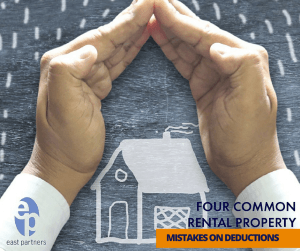While it is not uncommon to make some mistakes when claiming rental property deductions, it is important for investors to get their expense claims right to avoid facing potentially harsh penalties.
In our experience, there are four problems areas where investment property owners are incorrectly (whether inadvertently or deliberately) claiming deductions that don’t necessarily reflect their circumstances.
1. Claiming excessive deductions
This is a common issue, particularly involving holiday homes. Deductions may only be claimed for the periods when the holiday home was rented or when it was genuinely available for rent. Further, deductions should be limited in proportion to the income earned where that income is below the market rate.
2. Splitting income & deductions
Persons who own property together but divide the income and deduction unequally with the aim of achieving a tax advantage are an easy target for the ATO. Unless a property is held as “tenants in common”, income and deductions on a property must be split in equal proportion between the owners.
3. Claims for repairs & maintenance
This is perhaps the most common problem that we see in claims made on investment properties. To be fair, it can be a grey area but there are some definite areas that will raise suspicion with the ATO. Specifically, claims for “initial repairs” (ie. work done before the property is rented) is a consistent issue where claims are either restricted or are not deductible. In our view, this is perhaps the easiest area to get wrong yet the most important for an investor to seek advice.
4. Claiming for interest deductions
Interest expenses incurred for an investment property can only be claimed when the property is actually used to produce rental income. Properties that have split or multiple purposes can only claim interest on that portion that is used to generate income. Furthermore, an apportionment of interest may be required when the rental income is less than the market rate.
Seeking advice before a property is purchased is essential to determine what can and cannot be claimed and perhaps more importantly, can help avoiding a run in with the ATO down the track.




